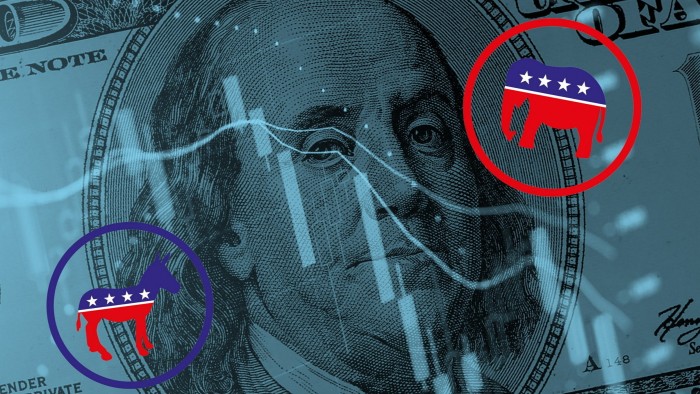More investors put their money where their vote is

Simply sign up to the ESG investing myFT Digest -- delivered directly to your inbox.
As political differences widen in western countries, voter positions are increasingly shaping decisions beyond elections — from whether to wear a mask during the Covid-19 pandemic, to what food to eat, or car to drive. Recent research suggests that political leanings have also become an important determinant of how individuals invest, with significant economic consequences.
Researchers at MIT have shown that investors’ economic outlook is coloured by their political views. They have also found that their willingness to take on financial risk depends on how their views align with those of the government. For example, during the Trump presidency, Republicans were more optimistic about the future of the US economy than Democrats. Such different expectations led Republicans to be more bullish and to hold more stocks in their portfolios, relative to less risky cash or bonds.
Our ongoing work with Yihui Pan, Elena Pikulina and Tracy Wang shows that even the composition of investors’ stock holdings differs according to political opinions. We examined the investments made in the past 25 years by wealthy American households who are likely to differ in their political orientation. While such differences for a long time played no role in portfolio composition, they have emerged as a significant determinant in the past decade.
To distinguish between correlation and causation, we explored the entry of Sinclair, a conservative TV network, into local media markets. Its arrival is associated not only with an increase in a rising local Republican vote in a region but it also appears to alter the composition of local equity portfolios.
The politically driven divergence of how Americans invest is striking and in sharp contrast to the overall convergence of portfolio composition that one would expect, given the benefits of diversification and the low cost of index-based investing. It raises the question of what causes this divergence and what the consequences might be.
While the causes appear multi-faceted, a combination of two forces offers a plausible explanation: political affiliations increasingly drive norms and values, and values are influencing investment decisions more and more — such as through ESG investing.
Recent sociological research shows that the role of political affiliation in shaping values has substantially increased in recent years — but the role of income, race, gender and whether people live in urban areas has remained largely flat or even declined.
At the same time, values-based investing is on the rise. Today, even financial advisers catering to wealthy Americans with median-sized accounts of $1mn commonly offer investment restrictions and exclusions based on social and environmental concerns, even if the monetary and non-monetary promises of values-based portfolios remain questionable.
Indeed, examining the investment share in companies about which there are environmental or labour concerns, and that in small firearms manufacturers and distributors, suggests a clear pattern. Among wealthy households with financial advisers, those that are more likely to be Democrat-leaning significantly underweight such companies. Meanwhile, investors that are more likely to lean to the Republicans seem to underweight firms led by a Democratic chief executive.
Politically motivated portfolio segmentation has several potential implications. First and foremost, risk-sharing in the economy could decrease as political preferences lead to under- and overweighting of certain companies, industries or sectors.
Second, companies and investors will have to be aware of the non-financial preferences of their likely shareholders. For example, when, in 2018, US groups had to disclose the ratio of chief executive pay to median-worker pay for the first time, the market reaction to companies with the biggest differences was significantly more negative among more Democratic and inequality-averse shareholders. Those investors were more likely to rebalance their portfolios away from such businesses.
Finally, politically induced differences in portfolios could further reinforce the divide in society if investors vote in line with their economic interests. So, while political preferences might, for example, lead to investments in “green” firms and technologies, they in turn provide an economic incentive in favour of certain policies and political affiliations — creating a feedback loop between political and economic interests.
It therefore seems that broad diversification in the form of “holding the market” might not only be good investment advice but could also help counter the increasing political polarisation of society.
Stephan Siegel is the Michael G. Foster Endowed Professor of Finance & Business Economics at the Michael G. Foster School of Business, University of Washington, Seattle

Comments